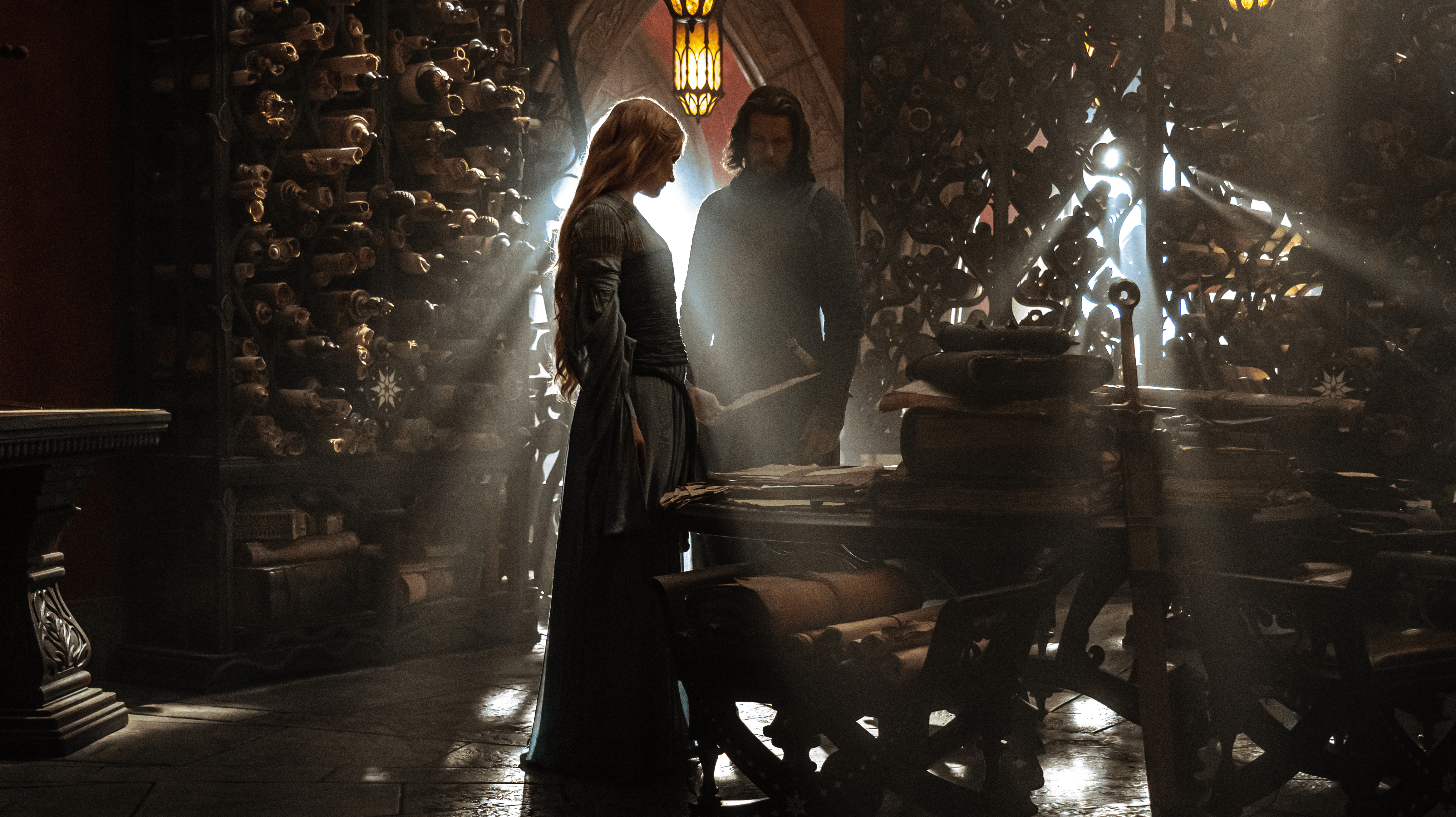The Lord of the Rings is a story about disparate societies coming together in the name of good — and casting aside generations of mistrust and prejudice to do so. Hobbits being unlikely heroes, Dwarves standing side-by-side with Elves, Rohan riding to Gondor’s aid, it’s an idea key to the fabric of the narrative, and so it makes sense that Rings of Power is making it key to its own story too.

“Adar,” the third episode of The Rings of Power, feels very much in step with its premiere last week in that it shares a lot of the same strengths and flaws Amazon’s lavish new series began with — just manifesting in slightly different ways. The series still keeps its grand scale and eye-wateringly-expensive beauty as we’re whisked away to the island of Númenor alongside Galadriel and Halbrand. The series is still almost achingly slow as it has to balance this — and many slow motion shots of everything from vistas to Galadriel riding a horse, as if to remind us to be looking at its fantastical excess as much and as often as possible — and its other plotlines, with far-off-disconnected characters like Nori and the Stranger, as the latter is discovered by the rest of the Harfoots, or Arondir, as he finds himself captured by Orcs.

But there is some progress made nonetheless, and with it comes more of the promise that Rings of Power has lying beyond its expensive spectacle. Although the episode is named for the mysterious Orcish master that Arondir and his fellow elves — and the humans of the Southlands — have been captured in the name of, its focus is largely, and rightfully, on Galadriel and Halbrand as they find themselves saved by a Númenorean sea guard ship and brought to the mystical island nation. There, we get to see a fascinating introduction; Halbrand might be human, but he’s never heard or even contemplated the idea of what an advanced human society such as Númenor could look like in his life. Galadriel, meanwhile, an Elf, can see the long game: she knows the history of how Númenor came to be and its original purpose, but she also knows that with the passage of that history there has come change, and Númenor is no longer a representation of that, thanks to Eldar and Valar alike for the humans that stood alongside them against Morgoth.
That’s symbolized by the icy welcome the duo receives — albeit one made icier by Galadirel’s own Elvish arrogance when confronted with hostility — from Queen Regent Míriel and Pharazôn. Rings of Power is playing with a bit of the vast timeline of Tolkien’s Second Age here, as lore-heads will instantly recognise Pharazôn’s name as the last king of Númenor, and the eventual Sauron-influenced architect of the island’s ruin. But that’s in the future; in the here and now is a focus on a now long-simmering distrust between Elves and Númenoreans. This is nothing new in fantasy, and this distrust is something that is part of Tolkien’s history here, but it’s an interesting mirror to focus on as the rest of the episode deals with people trying to find the strength to look past differences and face the hardships at hand. Galadriel, too laser-focused on her desire to get back to Middle-earth as quickly as possible, is dismissive of the Númenoreans and their concern. Míriel, and the rest of the Númenoreans, meanwhile cannot see past their own past with the Elves (and, in Míriel’s, particularly, some dire portents from her family and faith of potential doom should Elves return to her home) to pay attention to Galadriel’s warnings that evil is on the rise again.

We see the seeds of that mistrust elsewhere in the episode as well. Arondir, dazed and confused by his capture, finds himself and his fellow watchtower guards — including his captain, who had previously dismissed the humans they watched over as still feeling the lingering touches of Morgoth’s influence — isolated and in dire stakes when they’re all now captured and need to work with those humans to hatch an escape plan from digging tunnels to allow Orcs safe passage in daylight. Over with the Harfoots, Nori’s continued secrecy over encountering the mysterious Stranger from the sky is blown wide open when he accidentally stumbles into their pre-migratory remembrance of the nomadic haflings left behind — leading to the distrusting Sadoc to consign Nori’s family to the back of the caravan in the travel ahead, a fate that, with her father’s injured foot, is destined to see them left behind by the group.
Thousands of years apart or otherwise, this is Lord of the Rings, and as we said, this is a story about the people who choose to look past these distrusts and work together. By learning to trust the seaguard captain who rescued her in the first place — who it turns out is none other than Elendil, the future king of Gondor and Arnor, and here a former noble put into military service by Míriel’s own machinations for rule, just like his son Isildur is destined to follow in his stead — Galadriel finds one of the few Númenoreans who still remembers, and is open to, the friendship of the Eldar their nation was founded in. He helps her uncover the information she needs to not just figure out the Dark Lord’s real plans (the icon she has been chasing is not a sigil, but a map of the Southlands), but also uncover historical records that reveal that Halbrand himself has a noble lineage he’s been running away from.

In making a friend in Elendil, she brings Halbrand closer to her cause as well through this, after largely mistrusting the man. It likewise pays dividends when Nori, who stood up for helping the Stranger against the rest of her own people’s doubts — and saw her family punished for it — is rewarded for her kindness when the Stranger comes to their aid to push the family homestead, ensuring they won’t be left behind in the journey to the Harfoot’s next home. It’s only really Arondir that is left not to see the rewards of putting trust in someone — if anything, he gets punished for it, when the Elves’ plan to free themselves and escape Orc capture fails, serving as the climax of the episode. Most of his former allies dead, Arondir is dragged in to the Orc’s master, the titular Adar — who some have speculated could be Sauron himself in another guise.
We know Sauron still has a physical form at this point in the Second Age, and that he can indeed change form — after all, at some point he’s got to pretend to be a Valar emissary, Annatar, and convince Celebrimbor to make some cool jewellery. But is Rings of Power going to play its biggest card just yet? It seems unlikely, no matter how Sauron-esque that black armour stomping towards Arondir seemed at the end of the episode. Whatever Adar turns out to be, we know they have big, evil plans for the Southlands, and that Arondir is going to need to learn the lesson his distant other heroes in the show are starting to learn already: it’s always good to fight evil side-by-side with a friend, no matter where they come from.
Want more Gizmodo news? Check out when to expect the latest Marvel and Star Wars releases, what’s next for the DC Universe on film and TV, and everything you need to know about House of the Dragon and Lord of the Rings: The Rings of Power.
